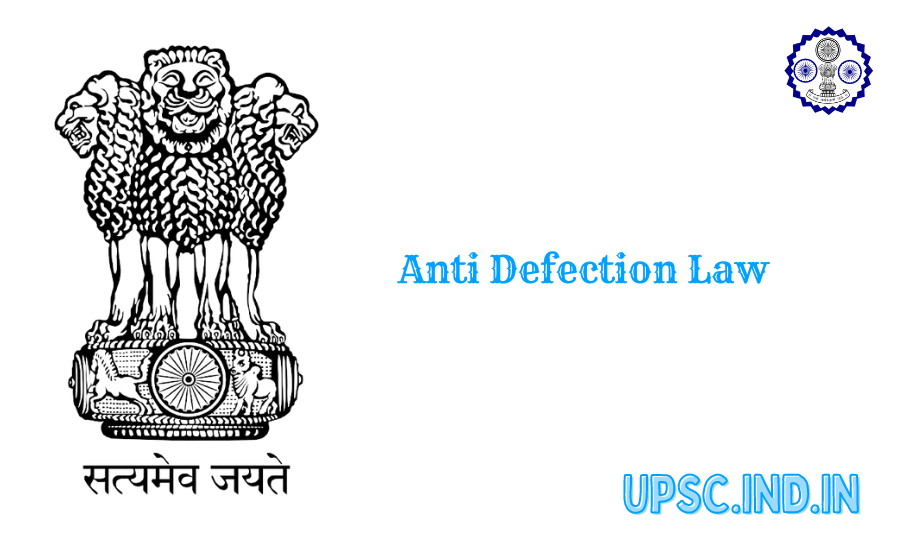Anti Defection Law UPSC |
Anti Defection Law UPSC |
Aspiring to serve the country via civil offerings is a noble endeavor, and the us (Union Public Service Commission) examination is the gateway to reaching this dream. As UPSC candidates put together for the tough Mains exam, a crucial topic that merits their attention is the Anti-Defection Law UPSC. This regulation, enshrined inside the Tenth Schedule of the Indian Constitution, performs a pivotal position in maintaining the integrity of the parliamentary machine in India. In this newsletter, we will discover the intricacies of the Anti-Defection Law UPSC and its importance for aspirants.
| For Prelims: Anti-Defection Law, Supreme Court (SC), Tenth Schedule of the Constitution, Members of Parliament, 52nd Amendment Act, 1985, 91st Constitutional Amendment Act, 2003. For Mains: Anti-Defection Law, Statutory, regulatory, and various quasi-judicial bodies, Separation of powers between various organs, Amendments. |
Understanding the Anti-Defection Law UPSC What Is It?
The Anti-Defection Law UPSC is a constitutional provision aimed toward preventing elected individuals of legislatures from switching political events or disobeying their birthday party’s whip on votes. This Anti-Defection Law UPSC, regulation was added to scale down political defections and make certain balance in the government.
History and Evolution of the Anti-Defection Law UPSC
The Anti-Defection Law UPSC became introduced to the Constitution in 1985 thru the 52nd Amendment Act. It has in view that been amended to address diverse prison demanding situations and loopholes.
Anti Defection, Role of Speaker, 10th Schedule (UPSC Notes – GS 2) –
Provisions of the Anti-Defection Law UPSC
The Anti-Defection Law UPSC units clean recommendations for disqualifying contributors of parliament or kingdom legislatures if they violate the law. Key provisions consist of disqualification if member voluntarily gives up their club of political birthday celebration or votes against their celebration’s whip.
Role in Ensuring Stability
The Anti-Defection Law UPSC plays a crucial position in making sure the stableness of governments at the state and country wide ranges. It prevents elected representatives from switching events frequently, that may cause instability and frequent adjustments in authorities.
Impact on Political Parties and Governance
Understanding the Anti-Defection Law UPSC is important for aspirants, because it immediately affects the functioning of political events and the governance of the country. It is tool to keep celebration area and make certain that the government’s time table isn’t always disrupted by way of the whims of person individuals.
Challenges and Criticisms
While the Anti-Defection Law UPSC serves an vital motive, it has faced complaint for being misused by using political events. Aspirants should be aware about these challenges and the continued debates surrounding the law.
Relevant Case Studies
The Anti-Defection Law UPSC has been examined in several excessive-profile instances in Indian politics. Understanding these case research can provide valuable insights into the practical utility of the regulation.
Importance for UPSC Examination
The Anti-Defection Law UPSC is vital subject matter for aspirants because questions associated with it regularly seem within the General Studies Paper-II (Polity and Governance) of the Mains exam. A complete know-how this law is vital to reply questions and perform properly within the examination.
Preparation Strategies
To master the Anti-Defection Law UPSC, aspirants must take look at applicable constitutional provisions, amendments, case legal guidelines, and the law’s effect on Indian politics. Consulting textbooks, felony sources, and previous years’ query papers may be instrumental in powerful preparation.
Conclusion
As UPSC aspirants equipment up for the Mains exam, understanding the Anti-Defection Law UPSC is vital. It’s a subject that no longer best holds importance inside the examination however additionally inside the broader context of Indian governance. A thorough grasp of this law will absolutely bolster an aspirant’s readiness to serve the country through civil offerings.
